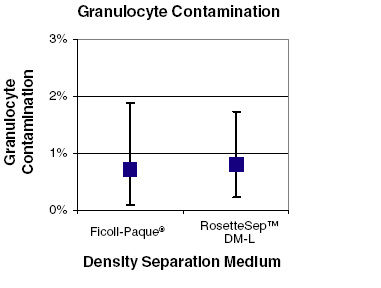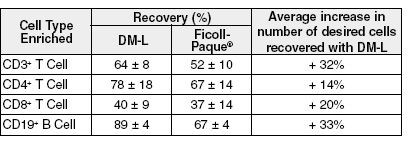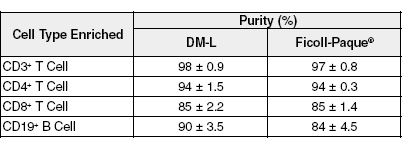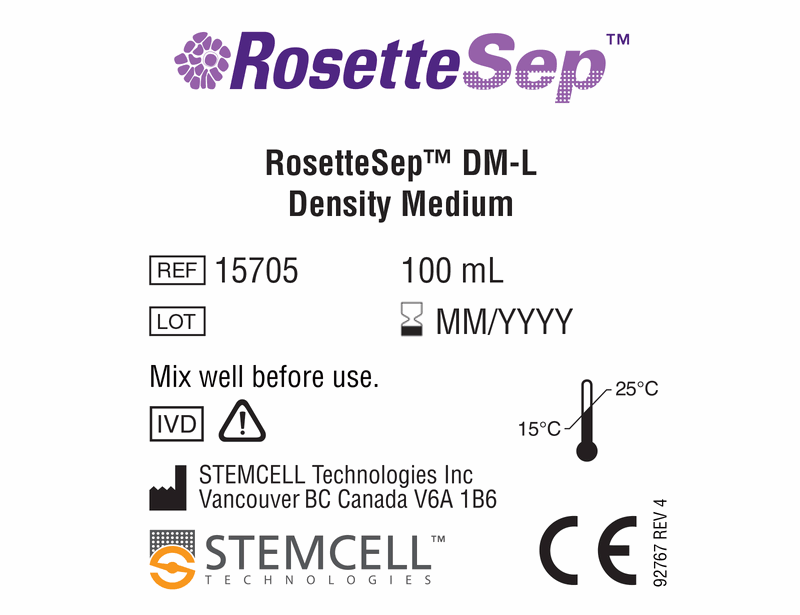RosetteSep™ DM-L Density Medium
Density gradient medium
概要
RosetteSep™ DM-L is a density gradient medium designed specifically for use with RosetteSep™ cocktails for the enrichment of specific human lymphocyte populations (CD3+ T cells, CD4+ T cells, CD8+ T cells, and B cells) from whole blood. RosetteSep™ DM-L has a density of 1.081 g/mL. This kit carries the CE mark and is available as a Class I in vitro diagnostic device in the European Union and Australia. To learn more about the regulatory status of this product in your specific region, contact info@stemcell.com.
Contains
• Iodixanol
• Hetastarch
• Sodium chloride
• Sodium lactate
• Dextrose
• Calcium chloride
• Potassium chloride
• Magnesium chloride
• Water
• Hetastarch
• Sodium chloride
• Sodium lactate
• Dextrose
• Calcium chloride
• Potassium chloride
• Magnesium chloride
• Water
Subtype
Density Gradient Media
Cell Type
B Cells, T Cells
Species
Human
Sample Source
Buffy Coat, Whole Blood
Selection Method
Negative
Application
Cell Isolation, In Vitro Diagnostic
Brand
RosetteSep
Area of Interest
Immunology
技术资料
| Document Type | 产品名称 | Catalog # | Lot # | 语言 |
|---|---|---|---|---|
| Product Information Sheet 1 | RosetteSep™ DM-L Density Medium | 15705 | All | MULTI |
| Product Information Sheet 2 | RosetteSep™ DM-L Density Medium | 15705 | All | English |
| Safety Data Sheet | RosetteSep™ DM-L Density Medium | 15705 | All | English |
数据及文献
Data

Figure 1. Minimal Granulocyte Contamination Using RosetteSep™ DM-L Density Medium
Granulocyte contamination is typically less than 1% when enriching lymphocytes from fresh whole blood using RosetteSep™. There was no significant difference in the level of granulocyte contamination when using RosetteSep™ DM-L in place of Ficoll-paque PLUS to enrich lymphocytes (N=11)

Figure 2. Rosettesep™ DM-L Improves the Recovery of Lymphocytes Enriched with Rosettesep™ from Fresh Blood

Figure 3. Cell Purity Is Equivalent or Higher for Rosettesep™ Lymphocyte Enrichment Using Rosettesep™ DM-L Instead of Ficoll-paque®
Publications (1)
Proceedings of the National Academy of Sciences of the United States of America 2011 JAN
Completely phased genome sequencing through chromosome sorting.
Abstract
Abstract
The two haploid genome sequences that a person inherits from the two parents represent the most fundamentally useful type of genetic information for the study of heritable diseases and the development of personalized medicine. Because of the difficulty in obtaining long-range phase information, current sequencing methods are unable to provide this information. Here, we introduce and show feasibility of a scalable approach capable of generating genomic sequences completely phased across the entire chromosome.


